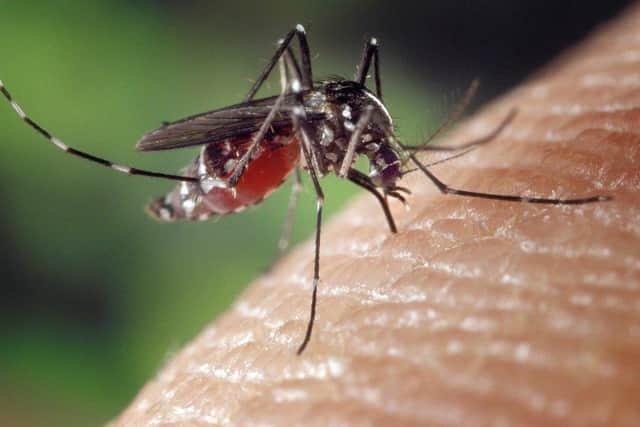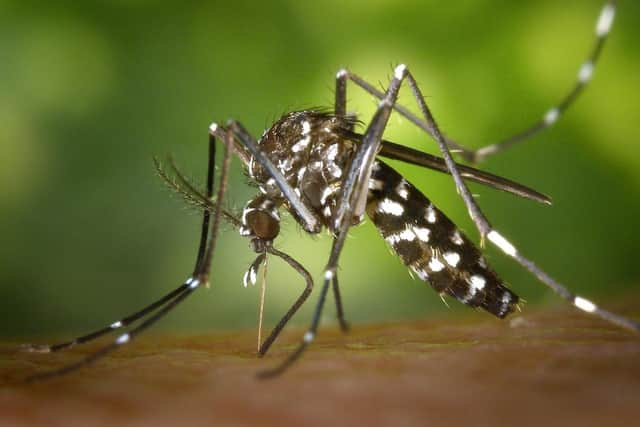Northern Ireland struck by surging mosquito plague - increasing numbers are here to stay with increased risks from Malaria, West Nile Virus, Usutu Virus, Dengue and Chikungunya Virus
and live on Freeview channel 276
The News Letter has received a number of reports of readers suffering an unusually high and persistent number of mosquitos in their homes in Co Down in recent weeks.
In particular, the problem becomes apparent when people awake in the morning to find that they have itchy red welts on their ankles or neck where the uninvited visitors have bitten the night before.
Advertisement
Hide AdAdvertisement
Hide AdMosquito expert Dr Ross Cuthbert from the School of Biological Sciences at Queens University Belfast (QUB) confirmed that numbers of the annoying insects in Northern Ireland have surged recently.


"Mosquito numbers are highly weather dependent," he told the News Letter. "The recent warm and wet spells have boosted mosquito numbers by speeding up their development from larvae to adults and providing more water bodies for adults to lay their eggs around. Storage of water on properties can also increase mosquito numbers and produce 'heat islands'. We are likely to see greater numbers of mosquitoes in future as climates change and urban areas expand."
There are no precise figures from this year, he said.
"But this is part of a wider trend attributable to changing climate, land use and invasive species, both in Northern Ireland and around the world."
"There are at least 18 species of mosquito in the Republic of Ireland and Northern Ireland. Their abundances are seasonal, being highest in spring and summer and declining substantially towards the winter. A larger mosquito population is likely as climates become warmer and wetter, which could also extend their breeding season."


Advertisement
Hide AdAdvertisement
Hide AdMosquitoes are part of the natural wildlife of the UK and Republic of Ireland and there are dozens of species across these countries - 36 known in the UK, he added.
"But there is certainly an ongoing trend for mosquitoes to be increasing in abundance and diversity. As temperatures warm, it can take as little as 10 days for mosquitoes to develop from egg to adult and the time it takes to process their blood meals to produce eggs reduces."
There is currently a low risk of mosquito-borne disease in NI, because the viruses are not actively circulating, he said.
"However, this risk is likely to change and mosquito species which can transmit viruses and malaria are already in Northern Ireland. Careful monitoring is needed to prevent zoonotic viruses which can jump from animals to humans, such as West Nile virus and Usutu virus, in particular."
Advertisement
Hide AdAdvertisement
Hide AdBoth have flu or fever like symptoms and most people make full recoveries, although symptoms can vary.
He added that there is a high risk of invasive mosquitoes arriving in Northern Ireland in future.
"For example, in England, the Asian tiger mosquito was recently detected and, if established, could spread into Northern Ireland in future as climates change. Elsewhere in Europe, this species is a vector of dengue and chikungunya virus."
Dengue and Chikungunya can both have flu-like symptoms but most people make a full recovery from them also.
Advertisement
Hide AdAdvertisement
Hide Ad"Basic steps can help to reduce mosquito problems, such as by eliminating unnecessary standing water around gardens where mosquitoes can breed, for example in artificial containers. Wearing long clothing can help to reduce nuisance biting, while insect repellent can help with exposed skin."
Researchers have warned that Dengue fever – a disease normally associated with tropical areas of the world – is becoming more prevalent in parts of Europe due to climate change.
The caution came after a woman from the UK was infected while on holiday in the south of France in September 2022, reporting a fever, headache, muscle pain and a rash for three days, but without needing further medical treatment.
Dr Owain Donnelly from the Hospital for Tropical Diseases in London said: “This individual was part of an outbreak of over 30 locally transmitted cases in the south of France in 2022, which highlights the rapidly changing epidemiology of dengue.
Advertisement
Hide AdAdvertisement
Hide Ad“With climate change, particularly hotter temperatures and more rainfall, and increasing global trade and tourism, we may see more parts of Europe with the right combination of factors for dengue outbreaks.
“Surveillance and reporting mechanisms are important in ensuring we have an accurate understanding of dengue spread.”